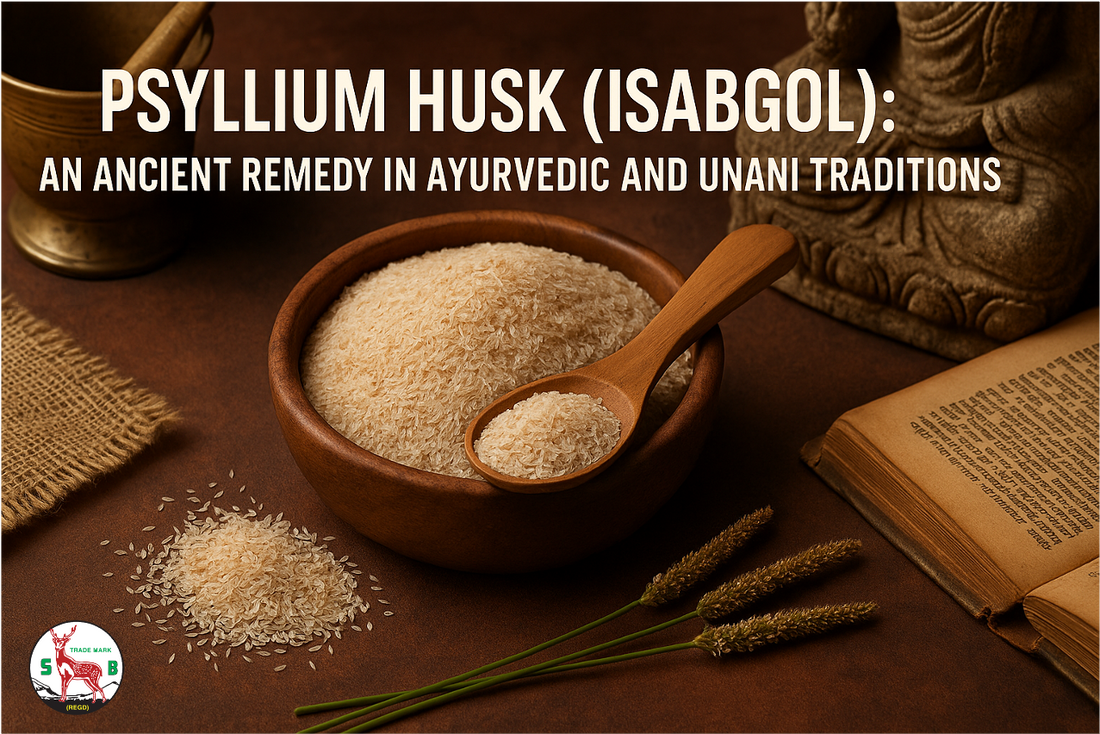
Psyllium Husk (Isabgol) Benefits: Ancient Ayurvedic & Unani Wisdom
Share
Discovering Psyllium Husk: A Timeless Remedy in Ayurveda & Unani Medicine
Psyllium Husk, widely known as Isabgol in India, is a remarkable dietary fiber from the Plantago ovata plant. Celebrated for its unique ability to form a gel when mixed with water, Psyllium Husk has been a cornerstone of traditional healing for centuries. While modern science highlights its digestive advantages, its profound legacy is deeply rooted in the ancient systems of Ayurveda and Unani medicine.

Ayurveda, the holistic Indian healing system, focuses on balancing the body's vital energies, known as Doshas. Its ancient texts have long revered Isabgol for its therapeutic properties. Similarly, Unani medicine, a system with Greek origins developed by influential scholars like Ibn Sina (Avicenna), utilizes the concept of humours and temperament (Mizaj). Unani texts also extensively document Psyllium's diverse uses.
The widespread adoption of Plantago ovata across both traditions underscores a fascinating exchange of botanical knowledge. Though native to the Mediterranean, Psyllium Husk thrived in India, becoming widely cultivated and appreciated for its powerful health benefits.
The Ancient Journey of Psyllium Husk: From Mediterranean to India
The remarkable story of Psyllium Husk begins in the Mediterranean region, including Southern Europe, North Africa, and West Asia, where Plantago ovata is indigenous. From these origins, its medicinal properties were discovered and integrated into various ancient healing practices across different cultures.

Over thousands of years, as bustling trade routes connected distant lands, Psyllium Husk embarked on its own journey. It traveled to India, where it not only naturalized but became extensively cultivated, particularly in the northwestern states like Gujarat, Rajasthan, Punjab, and Haryana. This widespread cultivation in India speaks volumes about its recognized value and effectiveness within local healing traditions.
The presence of Psyllium Husk in both Ayurveda, an indigenous Indian system, and Unani medicine, which boasts roots in Greek thought and was shaped by Arab and Persian scholars, stands as a powerful testament to the cross-cultural exchange of botanical wisdom. It illustrates how ancient medical practitioners, despite their diverse philosophies, empirically observed and adopted effective natural remedies, sharing and integrating this invaluable knowledge across vast geographical and cultural landscapes. This makes Psyllium Husk a truly global ancient remedy, bridging diverse medical traditions.
Psyllium Husk in Ayurvedic Wisdom: The Power of Isabgol
Ayurveda, with its rich history of documenting medicinal plants, holds Isabgol in high regard. Known by Sanskrit names like Ashwakarna (horse's ear), referring to its seed shape, Isabgol's properties are meticulously defined.
Ayurvedic Properties (Rasa, Guna, Virya, Vipaka, Karma) of Isabgol
In Ayurveda, a substance's actions are defined by its fundamental properties. Here's how Isabgol is characterized:
| Property (Sanskrit) | Translation (English) | Description/Implication |
| Rasa | Madhura (Sweet) | Nourishing, soothing, contributes to bulk |
| Kashaya (Astringent) | Binding, drying (secondary effect) | |
| Guna | Snigdha (Oily/Unctuous) | Lubricating, moistening |
| Guru (Heavy) | Grounding, contributes to bulk | |
| Picchila (Slimy/Mucilaginous) | Coating, soothing, gel-forming | |
| Virya | Sheeta (Cooling) ❄️ | Reduces heat, inflammation, burning sensations |
| Vipaka | Madhura (Sweet) | Nourishing, building, contributes to laxative effect |
| Karma | Vata Pitta Shamaka | Balances Vata (dryness, irregularity) and Pitta (heat, inflammation) |
| Mriduvirechan Dravya | Mild laxative action | |
| Grahi | Absorbing, binding (in certain contexts) | |
| Shothahara | Anti-inflammatory | |
| Deepana & Pachana | Promotes digestion, prevents bloating | |
| Rasayana | Rejuvenative, supports gut health | |
| Arshoghna | Beneficial for hemorrhoids |
The "Snigdha" and "Picchila" qualities directly relate to Psyllium's mucilage, showing Ayurveda's deep understanding of its physical and therapeutic effects.
Traditional Uses and Therapeutic Benefits of Isabgol in Ayurveda
Isabgol is a cornerstone of Ayurvedic digestive health, with a wide array of therapeutic applications for various health concerns:
| Condition (Sanskrit/English) | Traditional Application/Benefit |
| Constipation (Vibandha) | The most common use; it increases moisture, softens stools, and helps bowel movements. |
| Diarrhea (Atisara) & Dysentery (Pravahika) | It absorbs excess water, firms loose stools, and has antimicrobial action. This dual action helps normalize bowel function by balancing both Vata and Pitta/Kapha imbalances. |
| Irritable Bowel Syndrome (Grahani Roga) | Helps regulate bowel movement and prevents excessive mucous. Fried seeds with ghee are specifically mentioned for IBS. |
| Hemorrhoids (Arsha) | Softens stool to reduce straining. |
| Hyperacidity (Amlapitta) | Neutralizes excess acid and provides a soothing effect due to its cooling nature. |
| Ulcerative Colitis (Raktatisara) | Soothes intestinal lining and helps prevent inflammation. |
| Weight Management (Sthoulya) | Promotes a feeling of fullness, delaying gastric emptying, aiding in appetite control. |
| Diabetes (Madhumeha) | Slows glucose absorption, helping blood sugar control. |
| High Cholesterol (Medoroga) | Binds to cholesterol, promoting its elimination. |
| Fever & Excessive Thirst | Traditionally consumed to alleviate burning sensations, thirst, and fever. |
| External Applications | Paste applied for inflammation, boils, and headaches. |
| Respiratory System | Used for dry cough. |
| Excretory System | Induces urine production, indicated for UTIs. |
Classical Ayurvedic Formulations and Usage Guidelines
Ayurveda emphasizes specific preparation methods and Anupanas (vehicles) to enhance effects:
| Preparation Method/Anupana | Purpose/Benefit |
| Warm milk | For Vata-type constipation. |
| Curd (yogurt) | For diarrhea. |
| Cold milk | For acidity. |
| Lukewarm water | For weight loss. |
| Triphala | For hemorrhoids. |
| Honey | For intestinal cleansing. |
| Lemon water | For cholesterol control. |
| Fenugreek (Methi) powder | For blood sugar regulation. |
| Buttermilk | For IBS. |
| Ghee | To protect gastric lining for ulcers. |
Psyllium Husk in Unani Medicine
The Unani system, developed by scholars like Avicenna and Rhazes, also extensively features Psyllium Husk, known as Ispaghula or Bazrulqatuna. Its Persian name "Aspaghol" also means "horse's ear," similar to the Sanskrit "Ashwakarna."
Unani Properties (Mizaj/Temperament)
Unani medicine classifies substances by their Mizaj (temperament). Ispaghula is consistently described as having a Cold and Wet temperament (Sard-o-Tar). This aligns remarkably with Ayurveda's "cooling" and "moistening" properties, showing a shared understanding despite different philosophical frameworks.
Traditional Uses and Therapeutic Benefits in Unani Medicine
Unani medicine uses Ispaghula for conditions consistent with its "Cold and Wet" temperament:
| Condition (Arabic/English) | Traditional Application/Benefit |
| Constipation (Qabz) | Widely used as a bulk laxative and stool softener. |
| Diarrhea (Zaheer, Ishal wa Pechish) | Effective in absorbing excess fluids and acts as an anti-diarrheal agent. |
| Intestinal Ulcers & Peptic Ulcers | Its soothing properties help reduce inflammation and protect the intestinal lining. |
| Hemorrhoids | Reduces bleeding, improves symptoms, and acts as a stool softener. |
| Intestinal Cramps and Wounds | Traditionally used to alleviate these conditions. |
| Diabetes Mellitus | Helps regulate blood glucose levels. |
| Hyperlipidemia | Improves lipid profiles and reduces cholesterol levels. |
| Dry Cough (Su'ale yabis) | Used for its demulcent and soothing effects on the respiratory tract. |
| Thirst (Atash) | Alleviates excessive thirst due to its cooling and moistening properties. |
| Fevers (Hummiyat) | Employed in the management of fevers. |
| Kidney and Bladder diseases | Used for various ailments of the urinary system. |
Bridging Ancient Wisdom with Modern Understanding
The consistent use of Psyllium Husk across Ayurveda and Unani medicine for digestive regulation, inflammation, and metabolic conditions highlights a remarkable convergence of ancient knowledge.
Shared Therapeutic Focus
Both traditions primarily use Psyllium for:
| Primary Use | Ayurveda | Unani |
| Constipation | ✓ | ✓ |
| Diarrhea | ✓ | ✓ |
| Hemorrhoids | ✓ | ✓ |
| Digestive Ulcers | ✓ | ✓ |
| Diabetes | ✓ | ✓ |
| High Cholesterol | ✓ | ✓ |
This strong overlap suggests that Psyllium's effectiveness is based on its fundamental physiological effects, observed by ancient practitioners.
Scientific Validation of Psyllium Husk's Benefits
Modern scientific research increasingly validates many of the traditional uses and benefits attributed to Psyllium Husk, providing mechanistic explanations for ancient observations:
- High Fiber & Mucilage Content: Psyllium's soluble fiber forms a gel when hydrated, which swells and traps water. This bulk stimulates intestinal movement, softens stools, and eases their passage, explaining its traditional use as a laxative. This aligns with Ayurvedic "Guru" (heavy) and "Picchila" (slimy) properties.
- Gut Microbiome & SCFAs: The soluble fiber is fermented by gut bacteria into beneficial Short-Chain Fatty Acids (SCFAs), improving gut flora and motility.
- Blood Sugar Control: The gel formed by Psyllium slows down the digestion and absorption of carbohydrates, preventing sharp spikes in blood sugar after meals.
- Cholesterol Reduction: It binds to cholesterol in the digestive tract, promoting its elimination and improving blood lipid profiles.
- Anti-inflammatory Effects: Its ability to reduce intestinal inflammation and soothe mucosal linings is supported by modern findings. This provides a scientific basis for its traditional "cooling" and "soothing" properties.
- Weight Management: By delaying gastric emptying and promoting a feeling of fullness, Psyllium Husk helps reduce overall calorie intake.
These scientific mechanisms directly explain and validate the centuries-old observations, bridging ancient wisdom with contemporary understanding.
A Practical Guide to Safe Usage
Both ancient traditions and modern science emphasize important considerations for safe and effective use of Psyllium Husk:

| Key Consideration | Detail |
| Hydration is Crucial | Always consume Psyllium with plenty of water. Insufficient fluid can lead to bloating, choking, or even esophageal obstruction. |
| Mineral Absorption | High doses or prolonged use may decrease the absorption of essential minerals like iron, phosphorus, and calcium. |
| Cycling Herbs for Long-Term Use | To mitigate potential issues, Ayurvedic practitioners traditionally recommend rotating Psyllium Husk with other laxatives like Triphala for long-term management. |
| Contraindications | Avoid if you have gastrointestinal obstruction, fecal impaction, or difficulty swallowing. |
| Pregnancy and Lactation | Its use is generally advised against during pregnancy and lactation due to potential uterine activity and laxative effects. |
| Drug Interactions | Consult a healthcare provider if taking prescription medications, as it can affect the absorption of other drugs. |
| Minor Adverse Reactions | Common minor adverse effects include flatulence, bloating, nausea, and indigestion. |
The Enduring Legacy of Psyllium Husk
Psyllium Husk, known as Isabgol and Ispaghula, stands as a testament to the profound botanical knowledge and empirical wisdom of ancient healing traditions. Its deep historical roots in both systems, coupled with a consistent understanding of its cooling, moistening, and bulk-forming properties, have established it as a versatile and invaluable remedy.
Today, contemporary scientific research continues to validate these ancient observations, providing modern explanations for Psyllium Husk's benefits. This scientific corroboration strengthens the credibility of traditional medicine and highlights the enduring relevance of time-tested natural remedies.
In essence, Psyllium Husk is more than just a fiber supplement; it's a powerful example of how ancient wisdom, rooted in meticulous observation and holistic understanding, continues to offer valuable insights for modern health and well-being. Its enduring legacy invites us to appreciate the profound connection between nature's remedies and human health, a connection that has been nurtured and passed down through millennia.

